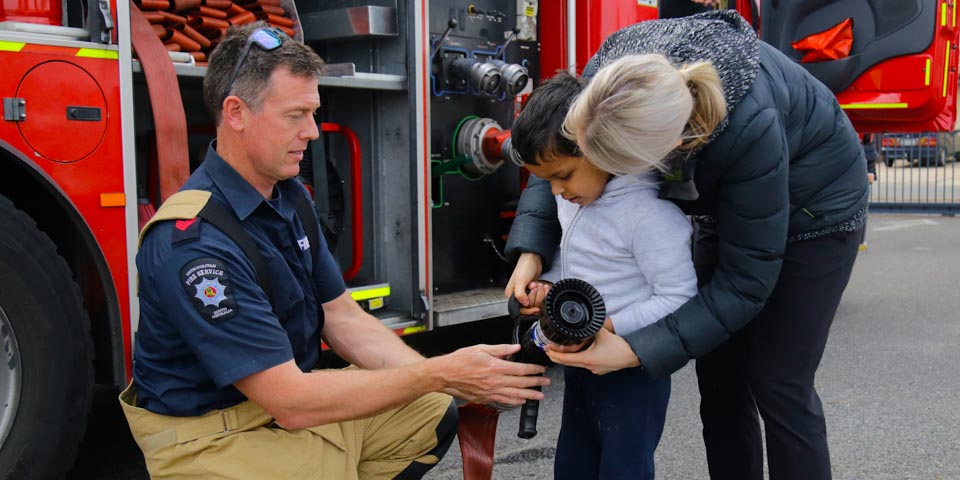Autism support and services in the community
There is a range of support and services available in the community to assist, and ensure inclusion for, autistic people of all ages, their carers, families and advocates.
Inclusion is about ensuring every person can access and fully participate in all aspects of society, irrespective of their age, disability, gender, religion, sexual preference or nationality. It’s about creating a society that is fairer, more cohesive, and richer for all.

The autism friendly charter

The Autism Friendly Charter assists business, organisations and venues to build capacity, inclusivity, understanding and awareness of autism. This is achieved by training and educating businesses across Australia about autism, and how they can be more inclusive of autistic people within their communities.
Training is delivered via free online training courses, and once 75 per cent of a business’s client-facing staff have completed the training, the business is eligible to make a Charter Commitment, and will be listed on the Autism Friendly Directory.
There are a range of other autism-friendly initiatives taking place within Australia, including the Autism Friendly Communities project, and Autism Awareness Australia, all with the focus on developing a more inclusive society.
Presence without participation can be more isolating than no presence at all.
Language
The language used to describe autism, and a person with autism, can have a big impact on people’s lives. As such, some autistic people have strong preferences about language choices.
Generally, there are two language positions:
- Person first language (“person on the autism spectrum”) puts the person before their diagnosis.
- Identity first language (“autistic person”) implies that being autistic is a core part of a person’s identity.
At The Spectrum, we use both terms interchangeably, in recognition that each and every person in the community has their own opinion and personal preferences, and it’s important to represent these diversities of opinions and preference in written language when discussing autism.
For further information about inclusive use of language, visit the quick reference guide on the Australian Network on Disability website.
The law
Autistic people have the same rights and responsibilities as any other adult or child in the community – to be treated with dignity and respect, and to be free from abuse, neglect, and treatment against their will. They have the right to manage their own finances and make their own decisions.
The rights of autistic people and their families are protected under a number of pieces of legislation at the national and state level. This includes the Disability Discrimination Act, and State and Territory human rights and equal opportunity agencies, which deal with disability discrimination issues under the legislation they administer.
The law and education
Autistic people have the right to access education at the school of their choice, and to ask for modifications to ensure parity with students without a disability. Primary, secondary and tertiary education providers must make modifications to their environment, assessment and learning materials if required.
The law and work places
Work and school should be free from bullying, harassment or discrimination for all individuals, regardless of disability.
Autistic people being discriminated against, harassed or bullied in the workplace have right to make a complaint or report bullying and harassment to their Work Safe/Safe Work authority. As a carer, flexible work options should be made available to you via negotiation with your employer.
The law and services
Families, parents, carers and individuals on the autism spectrum have rights as service users. Service providers should provide a list of your rights and responsibilities as a service user to you in writing. This information should be easy to read, in a language or format that you understand. Information about eligibility for service and costs should also be provided.
If you feel your rights, the rights of your child or the rights of your family have been violated or you have been discriminated against, you can contact your State or Territory human rights and equal opportunity agency to make a complaint.

Accommodation and housing
If you, your child, or a young adult you care for is autistic, you might have started thinking about future living arrangements.
Depending on your needs, there are a range of accommodation and housing options available for individuals, to enable independent living, or living at home.
No matter which type of accommodation you and your child feel is most suitable, it is highly recommended you plan these future living arrangements well in advance of when it is needed.
The Autistics’ Guide to Adulthood is a free online resource that includes a module on Living Independently. Topics covered in the module include;
- Preparing to live independently
- Supports and services
- Managing housemates
- Practicing self-care
The resource can help you to understand the different living arrangements.
Government support outlined in your, or your child’s, NDIS plan, or available through local and state governments, may help cover some of the costs of accommodation or paid carers that can support you or your child to undertake daily tasks. For more information about accommodation and housing in your state or territory, contact your local autism service provider.
- Living in your own home
Many people on the spectrum live in their own home. Some may have long term life partners or children who they share their home with. Most own a home with support from their loved ones including parents, partners and friends.
- Living in your own home, with support
Some autistic people may choose to live in their own home, flat, or unit, with the help of daily or weekly assistance from paid carers or service providers, this could include help with tasks like supermarket shopping or household chores.
- Living with a full-time carer
An autistic person may want to live in their own home (or the family home) with a live-in paid carer.
- Living with family
Many people on the autism spectrum live with their parents into adulthood, with their parent or sibling who may become their primary carer. Some families build a relocatable unit, or granny flat in their backyard, enabling children or dependants to live semi-independently of the family home, while still having the support they need nearby.
- Group care arrangements with friends
Sometimes, a group of friends or people on the autism spectrum decide to live together in a share-house style arrangement, with the support of carers. This can be an option for those who want to be independent of family but still need support and would like a sense of community.
- Supported shared living arrangements
Some disability agencies and state governments manage community living arrangements, where a number of people with a disability may live together with fully staffed care and supervision and attend work or other day activities. People living in these houses or units contribute to costs. Each person’s application is assessed on the basis of need and considered against the needs of others.
- Supported independent living arrangements
This may occur when there are complex needs, and the individual lives in an independent living arrangement with continuous 24-hour support.
- Housing co-ops
Sometimes, an autistic person might be able to access affordable housing through a community housing Co-op.

Short term accommodation
In some instances, you, your child or dependent may benefit from taking a break from the current living arrangement. Short term accommodation can provide you, your child or dependent with some time out and a short break away. Short term accommodation (in groups or individually) provide options for someone to look after your child, or adult dependant, for a period of time ranging from a few hours to a few weeks. Short term accommodation options can be accessed occasionally, such as in school holidays, or on a more regular basis, and can occur in your own home or somewhere else.
Short term accommodation can be delivered by specialist carers, informally by family and friends, or through community recreation activities.
Short term accommodation options can be a service that gives parents and an individual the chance to recharge and look after themselves, to spend time alone, with a partner, friend, or other children.
It’s okay to feel apprehensive about leaving your child or dependant with someone outside the family – for a smooth transition, make some time for short term accommodation carers to get to know your child or dependant before you and they take a break.
The main types of short term accommodation services are listed below. For more information about short term accommodation services in your state or territory, contact your local autism service provider.
- Formal short term accommodation care services
Formal short term accommodation options, will depend on where you live, your child or dependant’s age and needs, and what you want to get out of short term accommodation. It’s common for short term accommodation services to have waiting lists, so be prepared and book in advance.
- In-home short term accommodation services
In-home short term accommodation services means that a carer comes to your home to care for your child or dependant – whether for a few hours, overnight, or for a few days – the choice is yours. The carer can stay at home, or take your child or dependant on outings.
- Centre-based short term accommodation services
Centre-based short term accommodation services can care for your child or dependant in a group for part of the day or for a few days. Often, they organise group activities and outings for the period of the stay. - Community access short term accommodation
To help your child or dependant develop independent living and social skills, you might like to consider community access short term accommodation. This is usually delivered in a group in a neighbourhood house, or at a community health centre. - Facility-based short term accommodation
Facility-based short term accommodation is when your child or dependant stays at a residential care home or at a cottage-style short term accommodation house, either overnight, or for a longer stay.
- Family and friends
Family and friends can be an excellent source of support for you and your family. While it can be hard to ask for help or accept help when offered, it can be beneficial to ask family and friends to look after your child or dependant now and then to give everyone a break.
- After-school and vacation care
If you have a school-aged child, after-school and vacation care, delivered by schools or providers like your local autism service provider or YMCA, can offer fun and inclusive activities before and after school, and during school holidays.
- Recreational activities
Local libraries, sporting clubs, Scouts and Guides and other community groups offer fun and engaging activities for children to get involved with, and can also give you an opportunity to have a break and connect with other local parents.
- Camps
For a few days’ break, you might like to consider enrolling your child in a camp, specifically for autistic children or individuals with additional needs. These are run by government-funded or community organisations.
- Mainstream child care
Through the Australian Government’s Inclusion Support Programme, there are day care centres, family day care and occasional care services that receive support to include children with additional needs.



